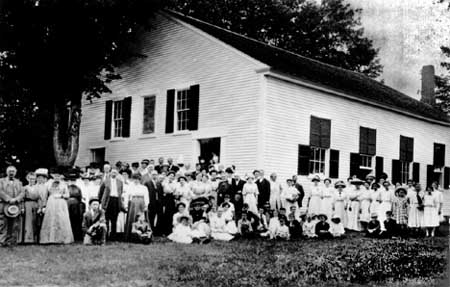
Organized in 1773. The first meetinghouse was built on the Lower Gilmanton militia training field in 1774. It was moved before 1788 to the parcel that it is on now, on the east side of Province Road. It was rebuilt in 1842 due to poor condition. It is on the National Register of Historic Places.
Built in 1826-1827 and is located in the center of Gilmanton village for a local Congregationalist congregation. It still has the original flooring and woodwork and kerosene light fixtures which are no longer used. Rev. Herman Rood was the first pastor. It was ordained July 12, 1826. The new church was built at a cost of $3,500 and was dedicated Sept 30, 1827. Rev. Rood was followed by Rev. Mr. Lancester after his dismissal from the first church. Other pastors and supplies were: Roger M. Sargent, Joseph Blake, S. S. N. Greeley and possibly others. It is on the National Register of Historic Places.
Constituted by an ecclesiastical council Oct 20, 1830. Mr. Charles G. Safford was ordained pastor Sept. 28, 1831. Others who have labored here in the early days are: Jeremiah Blake MD (a student at Gilmanton theological Seminary), Stephen S. N. Greeley, Rufus Childs, Jairus Ordway, N. S. Moore, George Rogers, Charles L. Tomblin, Cassander C. Sampson, E. J. Roke, Lyman White.
Organized between 1785 and 1790. The early organizers were Abel Glidden, Thomas Flanders and Ezra Ham. About 1835 Elder Hezekiah Buzziel was settled as pastor of the church and followed by Samuel P. Fernald, Benjamin McMurphy, Ichabod R. Cook, Thomas Kenniston, John M. Durgin, Moses Quimby, Gilman Sanborn, John C. Osgood, John M. Durgin, John B. Leighton, Wallace W. Brown, George W. Price, Orrin Pitts, James C. Nelson.
Organized about Jan 8, 1860. The Church was organized as Calvinistic Baptist about 1773. The data of the earlier church is very incomplete. It is said within the walls of the church was a trial for heresy of Elder Randall in 1779. The complaint was entered because he advocated the Free Will doctrine. tradition says he was acquitted. The pastors who were during the early Free Will history of the church were: Moses Folsom, John Malvern, J. C. Osgood, C. B. Griffin, J. G. Munsey, D. L. Edgerly, John M. Durgin, C. L. Plummer, John Chamberlain, L. E. Hall, and H. B. Huntoon.

Organized about 1780. It had a large house of worship and thriving settlement, but "long since" failed to be active.
Sources: The Town Register of Meredith, Tilton, Gilmanton, Sanbornton, Gilford, Belmont, NH, 1908. The History of Gilmanton, By Daniel Lancaster, 1845
Copyright © 1996 - The USGenWeb® Project, NHGenWeb, Belknap County